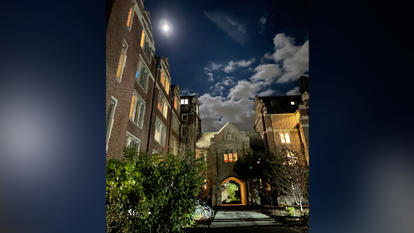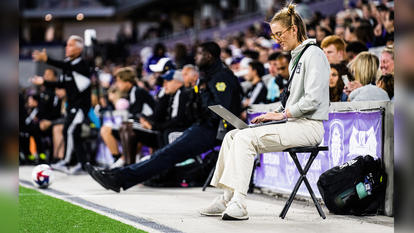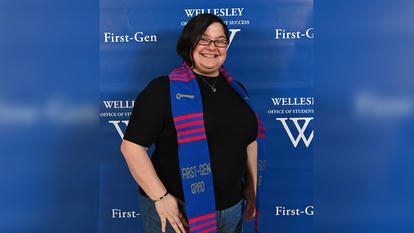Wellesley Professor Katharine H.S. Moon to Deliver 2019 Distinguished Faculty Lecture

Katharine (Kathy) H.S. Moon, professor of political science and the Edith Stix Wasserman Chair of Asian Studies at Wellesley, will deliver the College’s 2019 Distinguished Faculty Lecture, on April 1 at 4 p.m.
In her talk, titled “Friending Your Enemy: Dialogue with North Korea, Engaging the Other,” Moon will analyze the United States’ current relationship with North Korea and contrast it with South Korea’s attempts at relationship-building and reconciliation. Moon will also examine the power of finding common ground based on universal experiences and the impact that can have on possible policy transformations.
Foreign policy can seem abstract and removed, but in today's political landscape, it reflects so much of the divisiveness and mythmaking in American society, according to Moon. “I would like to take the lessons I’ve learned through my research and policy analysis and ask ourselves very personal questions about how we create our own enemies and sustain them,” she said. “What are the ways we create myths about ourselves and others to keep relationships separate, and the ways we thrive on ignorance as North Korea and the U.S. have done in order to confirm that our view of the other is correct? How do we get out of that pattern in order to learn and exchange as a way toward reconciliation?”
“Whether it is about policy or our campus life, I hope we learn to take up the challenge of befriending our enemies,” Moon said. “People can be so hostile in very explicit ways, and some of that hostility is fed by mutual myth-making and demonizing. The demonization of the other turns us into less than we can be because we might will ourselves to seeing fallacies or partial truths by caricaturing and diminishing the essence of people we don’t agree with.”
 Moon has been researching the basic universal experiences of all people that North Koreans also share for an upcoming book, North Korean Lives Matter. In interviews with North Korean diaspora in the U.S., U.K., Canada, and South Korea, she asks strictly apolitical questions—about love, friendship, family, death, and homeland, for example. She lets their own narratives define their political views.
Moon has been researching the basic universal experiences of all people that North Koreans also share for an upcoming book, North Korean Lives Matter. In interviews with North Korean diaspora in the U.S., U.K., Canada, and South Korea, she asks strictly apolitical questions—about love, friendship, family, death, and homeland, for example. She lets their own narratives define their political views.
“No matter how much academics write scholarly articles about the plight of North Koreans, no matter how much humanitarian aid workers assist those most deprived, and no matter how much policymakers try to understand what North Korea is all about—until and unless the rest of the world begins to see North Koreans as human beings first and political and economic beings second, we are not going to make much progress in terms of engaging constructively with that nation,” Moon said.
Moon carries the themes of finding common ground and learning about others into her work and her classroom. “I am a perpetual student,” she said, “I am always looking at what I don’t know and what I want to learn, and I am constantly trying to figure out how to reach different generations of Wellesley students and communicate with different kinds of audiences that have different kinds of agendas.”
Moon, who has taught at Wellesley since 1993, is an affiliated research faculty at the Korea Institute, Harvard University; a member of the Harvard Kennedy School Korea Working Group; and a member of the steering committee of the National Committee on North Korea. Previously, she was the inaugural holder of the SK-Korea Foundation Chair and Senior Fellow in the Center for East Asia Policy at the Brookings Institution.
“Kathy Moon has made immense contributions to Wellesley and to her field. Her classroom has always been famous as a place of intense and productive intellectual challenge,” said Provost Andy Shennan. “Her many publications addressing different aspects of the bridge between domestic politics and foreign policy are widely admired by other scholars. And to an extent unusual for academics, her work at the Brookings in Washington, D.C., has had a major impact in policy circles, encouraging a broadened discussion of the Korean peninsula beyond the issues of North Korea’s nuclear program.”
Sponsored by the Office of the President, the Distinguished Faculty Lecture was established in 1999 to provide an opportunity for the College’s accomplished and respected faculty members to deliver a public lecture that allows the community to reflect on the meaning of a liberal arts education.
“We are so fortunate that Professor Kathy Moon has brought her exceptional scholarship and leadership in the field of international relations and politics to our community,” said Wellesley President Paula A. Johnson. “She teaches students and the world to think critically about the nuances of diplomacy, the importance of relationship-building, and the interwoven complexities of our global society.”
Moon’s lecture will be held in Collins Cinema, followed by a reception in the Davis Museum Lobby.
Photo (inset): Katharine H.S. Moon, professor of political science and Asian studies, will deliver the 2019 Distinguished Faculty Lecture at Wellesley. Credit: Richard Howard.



